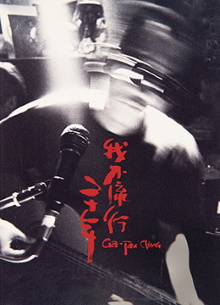I’m viewing these documentaries as part of the Isle to Isle event on the CloudTheatre platform so I’m sure the organizers must have noticed the thematic similarity between this one and André and His Olive Tree. This one is about Chang Ga-tau, the founder of one of Taiwan’s largest independent record companies Taiwan Colors Music, agonizing over whether to retire after 20 years in the business and selling his company. Once again I think it overdramatizes this decision for the sake of a making a film, and they even lampshade this in the after credits, plus the story of a record label owners probably isn’t as interesting as that of the artistes but it is a decently interesting look into Taiwan’s music scene.
Chang Ga-tau seems to be a well-known figure that this film assumes he doesn’t require an in-depth introduction as a singer-songwriter and most importantly in this context, the founder of Taiwan Colors Music. This sentence unfortunately loses a lot in translation as the names are much more flamboyant in Chinese. As he puts it, the name and concept of his record company stems from his youthful fascination with cool gangsters and wanted to uphold their values of loyalty and rebelliousness. The label would over the course of the next twenty years establish itself for signing musicians who are ignored by the mainstream labels and especially Taiwanese aboriginal music acts. It also becomes known for organizing the popular Hohaiyan Rock Festival every year and succeeds in propelling some acts to at least momentary fame. However the company has difficulty making any real money and so Chang contemplates selling the company to retire. This film follows him as he goes around meeting old collaborators and friends, some of whom he has not met in years, to ask them what they feel about him selling out especially as the likely buyers will be Chinese mainlanders.
As a record producer, Chang is of course a skilled promoter and this film doesn’t even pretend that it isn’t a form of self-promotion. While his dilemma is real as is his fear of being accused of handing over a piece of Taiwan’s culture to China, it’s clearly being dramatized for this film. I’d also argue that his mid-life crisis is really a crisis of management, of not having groomed a successor he trusts sufficiently to hand the company over to. He agonizes over not being able to exceed the accomplishments of yesteryear but doing that really calls for being to discover promising new talent and turning them into stars. No matter his passion and experience, it’s hard to imagine a relatively old guy having enough rapport with the young to do that. Furthermore, in this era of YouTube and hugely popular singing contests, new talent, even those of esoteric genres, has so many ways of directly appealing to the general public that the traditional music producer is arguably an obsolete profession. So he is left to manage a stable of the same talent he has always worked with, occasionally releasing their new music and it’s no wonder it’s not the most exciting of jobs.
I’m not much of a music person and this film wants to bank on a sense of nostalgia which doesn’t apply to me at all. It is nice to get to hear some of the music from the artistes that have signed up to his company and it is good music. It’s amusing when one of his artistes, Pau-dull, whose day job is a police officer, recounts how he is recognized by people on the street after winning an award. It’s also sobering to see how the relatively well-known Nanwan Sisters have to record their music using subpar facilities. At the same time, these are stories of the past. It’s not clear what else Chang is doing in the present other than organizing live performances for the old artistes in the his stable. I wish he could have talked more about the Internet for example and how it might be changing the music industry. From what I understand, record companies around the world are actually making decent money now having moved on from the old model of publishing music on albums to earning revenue from streaming on platforms like Spotify.
Anyway this documentary is mildly interesting and while Chang’s agony might be real, it seems like an ordinary mid-life crisis to me. It is heartening to see the other artistes encouraging him to sell if it’s what he needs to do. However from what I can tell, he still has not sold his company as of right now, so tired or not, I think he does still love what he does and is reluctant to give it up. It seems to me that he really needs to be better at leveraging online resources and perhaps move on from traditional music publishing. Niche music is flourishing all around the world and the key to that is tapping a global audience including marketing it in English, not just hoping to sell to the local Taiwan market.
